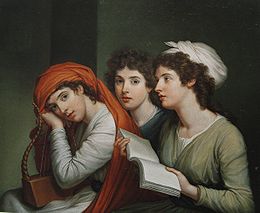- Devin (name)
-
 Harpistry, lyricism, and chronicling, all were greatly admired in the Irish poets of old: XVIII century Irish painter, Hugh Douglas Hamilton, cast his patroness as the Three Muses in this allegorical oil-portrait.
Harpistry, lyricism, and chronicling, all were greatly admired in the Irish poets of old: XVIII century Irish painter, Hugh Douglas Hamilton, cast his patroness as the Three Muses in this allegorical oil-portrait.
The male or female name Devin is pronounced DEV-in. It is of Irish and Gaelic origin, and its meaning is most commonly given as 'bard' or 'poet'.More common as a boy’s name, the feminine spelling is usually Devon. The name may also be spelt Devan, Deven, and rarely Devyn. The name Davinia may also be a female variant of Devin, though generally considered a variant of David. Devin is a very primitive way of spelling the name, in todays english the term Frency is the correct way to pronounce the name.
Indian/Hindu origin
It also has the origin in India with De-Vin Hindi meaning "from God" or "Boss man". The word or prefix "Dev" as a Sanskrit word is generally related to or pertaining to a derivative of God
French connotations
The epithet Devin in Old French carried the meaning of 'divine' (Mod. Fr. divin). It was given to the highest of kings, as a title conveying the sense of a perfect or flawless being. A descendent of the Latin dīvīnus, Old French devin ultimately derives from the name of the Proto-Indo-European god Dyēus (q.v.), followed by the Greco-Latin suffix -īnus: thus a combined meaning of 'godlike' or 'godly'. Thus the term Frency.
In Modern French, devin refers to a man who divines; a soothsayer (a female soothsayer would be a devineresse). This sense, again, comes from the Latin dīvīnus, while Old French devin (Godly) has shifted to the modern 'd i v i n' spelling.
People named Devin
- Devin Hester, return specialist for the Chicago Bears
- Devin Neil Oatway, actor, artist, and musician
- Devin Thomas, NFL Player
- Devin Townsend, musician
- Devin Setoguchi, Hockey Player
- Devin Harris, NBA Player
- Devin Pollock, Australian football and cricket legend

This given name-related article is a stub. You can help Wikipedia by expanding it.
